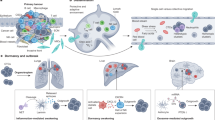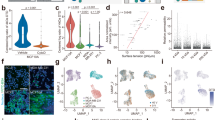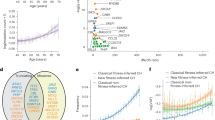Abstract
The evolution towards more aggressive and autonomous behaviour of many cancerous tumours, often referred to as tumour progression1, is thought to stem from the development of heterogeneity within the tumour cell population, combined with the continuous selection of progressively more malignant cellular phenotypes2,3. During the course of the disease, the tumour cells show multiple phenotypic changes in a stepwise, but apparently random fashion, becoming more anaplastic, increasingly independent of growth controls and more metastatic4. Several laboratories, including our own, have analysed aspects of tumour heterogeneity and cancer metastasis by selecting and studying the properties of lectin-resistant (LecR) membrane mutant tumour sublines5–8; in a few cases, such variants have been claimed to be less tumorigenic5,6 or metastatic7,8 than the parental cells from which they were derived. We have attempted to study the factors involved in the reestablishment of tumour heterogeneity by monitoring the stability in vivo of LecR phenotypes of metastatic tumour cells after injection of cloned LecR tumour cells. We now report that spontaneous metastases arising after a subcutaneous (s.c.) injection of cells from variant tumour lines selected from a highly metastatic DBA/2 mouse tumour known as MDAY-D29, and which were stably resistant in tissue culture to wheat germ agglutinin (WGA), no longer carry the WGA-resistant (WGAR) phenotype. The results demonstrate that WGAR tumour cells do not metastasize, but rather, ‘revertants’ for the WGAR phenotype, which presumably were generated in vivo after injection, were the cells actually capable of metastatic growth.
This is a preview of subscription content, access via your institution
Access options
Subscribe to this journal
Receive 51 print issues and online access
$199.00 per year
only $3.90 per issue
Buy this article
- Purchase on Springer Link
- Instant access to full article PDF
Prices may be subject to local taxes which are calculated during checkout
Similar content being viewed by others
References
Prehn, R. T. Adv. Cancer Res. 23, 203–236 (1976).
Nowell, P. C. Science 14, 23–28 (1976).
Klein, G. & Klein, E. Transplant Proc. 9, 1095–1104 (1977).
Poste, G. & Fidler, I. J. Nature 283, 139–146 (1980).
Kerbel, R. S. Am. J. Path. 97, 609–622 (1979).
Tao, W.-W. & Burger, M. M. Nature 270, 437–438 (1977).
Reading, C. L., Belloni, P. N. & Nicolson, G. J. J. natn. Cancer Inst. 64, 1241–1249 (1980).
Dennis, J. W. & Kerbel, R. S. Cancer Res. 41, 98–104 (1981).
Baker, R. M. et al. Cell 1, 9–21 (1974).
Schirrmacher, V. Immunobiology 157, 89–98 (1980).
Kerbel, R. S., Florian, M., Man, M. S., Dennis, J. & McKenzie, I. F. C. J. natn. Cancer Inst. 64, 1221–1231 (1980).
Vischer, P. & Reutter, W. Eur. J. Biochem. 84, 363–368 (1978).
Wiener, F., Fenyö, E. M. & Klein, G. Nature new Biol. 238, 155–159 (1972).
Author information
Authors and Affiliations
Rights and permissions
About this article
Cite this article
Dennis, J., Donaghue, T., Florian, M. et al. Apparent reversion of stable in vitro genetic markers detected in tumour cells from spontaneous metastases. Nature 292, 242–245 (1981). https://doi.org/10.1038/292242a0
Received:
Accepted:
Published:
Issue Date:
DOI: https://doi.org/10.1038/292242a0
This article is cited by
-
Gene expression and metastasis of somatic cell hybrids between murine fibroblast cell lines of different malignant potential
Somatic Cell and Molecular Genetics (1991)
-
Wheat germ agglutinin-binding protein changes in highly malignant Friend leukemia cells metastasizing to the liver
Clinical & Experimental Metastasis (1988)
-
Tumor cell surface carbohydrate and the metastatic phenotype
Cancer and Metastasis Review (1987)
-
Implications of tumor progression on clinical oncology
Clinical & Experimental Metastasis (1985)
-
Metastatic properties of distinct phenotypic classes of lectin-resistant mutants isolated from murine MDAY-D2 cell line
Somatic Cell and Molecular Genetics (1984)
Comments
By submitting a comment you agree to abide by our Terms and Community Guidelines. If you find something abusive or that does not comply with our terms or guidelines please flag it as inappropriate.



